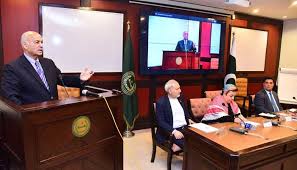IPI Calls for Concrete Action, Not Rhetoric from Arab – Islamic Summit

Celina Ali
Islamabad: Islamabad Policy Institute (IPI) has called on Muslim leaders to take concrete actions to stop Israel’s genocide in Palestine and its aggression against Muslim countries.
IPI, an Islamabad-based think tank, made this appeal in its recommendations for the upcoming Arab League–OIC Joint Summit, scheduled in Riyadh on Nov. 11. The recommendations were presented following an IPI-hosted seminar titled “Israel’s Genocide in Palestine & Regional Aggression: The World Order at a Crossroads?”.
The event gathered think-tank representatives, academics, and diplomats, all urging a unified and robust response from Muslim nations against Israeli actions, alongside tangible steps to counter the state’s aggression.
During the seminar’s opening, Senator Mushahid Hussain called for decisive action from the Muslim world regarding the escalating Palestinian crisis. He proposed that the Arab–OIC Emergency Summit establish a high-powered International Leaders Delegation — comprising Muslim leaders, as well as representatives from the Global South and Europe— to visit U.S. President-elect Donald Trump and advocate for an immediate ceasefire, humanitarian aid, and support for an independent Palestinian state.
Senator Mushahid further proposed key initiatives to address the Palestinian crisis, which included a Naval Humanitarian Flotilla comprising Türkiye, Pakistan, and Indonesia joining forces to break the Israeli blockade of Gaza under UN authorization, providing much-needed aid to the region; setting up Palestine Reconstruction Fund under OIC to rebuild Gaza and Lebanon; and establishing a Nuremberg-Style War Crimes Tribunal for holding Israeli leaders accountable for their aggression, ensuring justice and accountability for human rights violations.
Criticizing the OIC’s perceived inaction, he noted that “Muslim states have affluence without influence,” underscoring the need for credible action.
Iranian Ambassador Reza Amiri Moghaddam emphasized the pivotal nature of current Middle East developments, urging Arab nations to decide if they will align with Western-Israeli interests or stand in resistance, following the example of leaders like Sayyid Hassan Nasrallah. Moghaddam argued that the struggle between “right and wrong” will persist despite the West’s material dominance, accusing Israel and its allies of employing genocidal tactics as part of a broader “new world order” strategy.
Ambassador Moghaddam also criticized international institutions, including the United Nations and the Red Cross, claiming they are failing to protect human rights and are instead reinforcing a power structure favoring Western interests. He pointed out that even non-Western members of the Security Council, such as China and Russia, face limitations in acting against Western-aligned interests under the current global order.
Syrian Ambassador Dr. Ramez Alraee reflected on Israel’s long-standing aggression towards Syria and called for greater unity among Muslim countries to oppose Israel’s actions and support the Palestinian cause.
Dr. Shireen Mazari, Chairperson of IPI, expressed frustration over the Organization of Islamic Cooperation’s inability to respond effectively to the crisis in Gaza and the West Bank. She urged Muslim countries to adopt a proactive stance, both domestically and collectively, in confronting what she described as the genocide against Palestinians.
Dr. Mazari argued that the violence reveals a failure by powerful nations to uphold international law and the Responsibility to Protect (R2P) doctrine, which mandates intervention to protect vulnerable populations.
She warned that the global order is not simply at a crossroads but has been fundamentally destabilized, with repercussions extending far beyond the Middle East.
IPI chairperson cautioned that Pakistan must remain vigilant amidst the potential for broader conflict involving Iran and Israel but lamented that internal political crises have diverted the country’s focus. “We are so locked into internal political machinations and a reign of political terror,” she said, “that we have failed to acknowledge the shifting global landscape around us.”





